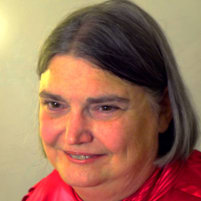Let's Lens
Let's Lens presents a series of exercises, in a similar format to the Data61 functional programming course material. The subject of the exercises is around the concept of lenses, initially proposed by Foster et al., to solve the view-update problem of relational databases.
The theories around lenses have been advanced significantly in recent years, resulting in a library, implemented in Haskell, called lens.
This workshop will take you through the basic definition of the lens data structure and its related structures such as traversals and prisms. Following this we implement some of the low-level lens library, then go on to discuss and solve a practical problem that uses all of these structures.
Learning Outcome
An attendee who completes this workshop should expect to confidently use the lens library, or other similar libraries, in their every day programming.
Target Audience
All
schedule Submitted 4 years ago
People who liked this proposal, also liked:
-
 keyboard_arrow_down
keyboard_arrow_downEdward Kmett - Logic Programming à la Carte
45 Mins
Keynote
Intermediate
I've been working on a logic programming framework in Haskell, called guanxi (關係) with an eye towards scalability. To build it I leaned heavily on my previous work on propagators and a bunch of other little bits and pieces of algebra and category theory in the design process. A number of patterns have arisen repeatedly throughout the process of building this library. I'll give a tour through the current state of guanxi and try to extract some of the more reusable bits of its design for your inspection.
-
 keyboard_arrow_down
keyboard_arrow_downBruce Tate - Joy - Maintaining Passion for Programming
45 Mins
Keynote
Intermediate
Many people in our industry are programmers because we're curious and passionate about coding. Each of us can remember latching onto a trivial programming problem and staying with it deep into the night. For far too many of us, that passion for programming fades under the slow, wilting heat of the day to day grind.
In this talk, Bruce Tate, author of Seven Languages in Seven Weeks, takes a frank look at the grind and offers some practical advice on putting the "fun" back into "functions". We'll introduce some pragmatic ideas to get you excited about the journey again. We can't always dramatically change our circumstances, but we can often make small tweaks to how we approach problems.
Come along. Enjoy the journey.
-
 keyboard_arrow_down
keyboard_arrow_downAaron Hsu - Programming Obesity: A Code Health Epidemic
45 Mins
Keynote
Beginner
Programs are getting fat. They're becoming slow. They're taking up more computing resources. They're getting harder to maintain and more complex from the ground up. Layer upon layer of sophistication is causing us to lose our ability to predict what software will do. Where's that bug? Why is everything going so slowly? Am I even using the right data structures? Where's that important point in the documentation again?
What's happened to us? In this meta-dive into the nature of our approach to programming, we will explore some of the dangers of our current approaches to programming and the how/why of our current programming obesity problem. We will look at real case studies and see just how bad the situation can be.
But we will also explore how we can battle these sources of obesity. In this passionate plea for code that we can gain control over again, we will look at examples of how we can return to a state of high-performance on all levels, from code size to code scalability. We will look at the principles that can help us to reach leaner, more efficient, more usable, less buggy code. We will hopefully find some light at the end of the tunnel, and how we can change our outlook on programming to push ourselves towards code that benefits not only ourselves, but also those that will come after us.
-
 keyboard_arrow_down
keyboard_arrow_downEdward Kmett - Propagators
45 Mins
Demonstration
Intermediate
There are a lot of algorithms that revolve around iterating a form of information propagation until it attains a deterministic fixed point. CRDTs, Datalog, SAT solving, functional reactive programming, and constraint programming all fit into this mold.
One framework for these sorts of algorithms is the notion of a “propagator” due to Sussman and Radul, but until now little rigor has applied to know how such algorithms terminate with consistent results. Another framework is Lindsey Kuper’s work on the notion of “lattice variables” (LVars), which addresses termination, parallelism and eventual consistency well, but not iteration.
By blending these frameworks, I’ll build up a series of sufficient conditions for propagators to terminate with consistent results and proceed to show how we can use this common framework to steal insights and quirks from each individual domain to try to optimize the rest.
-
 keyboard_arrow_down
keyboard_arrow_downAndrea Leopardi - BEAM Architecture Handbook
45 Mins
Talk
Intermediate
If you are writing a stateless web application backed up by a database, there is a good chance Elixir is a great fit. However, this is not where it shines. In this talk, we will discuss how to architect Elixir applications in order to leverage the features of the language and of its runtime.
We will look at this both from a lower level, talking about the architecture of processes inside an Elixir application, as well as from a higher perspective of writing Elixir services and architecting systems to play to Elixir's strengths. We will see practical use cases and discuss design patterns. -
 keyboard_arrow_down
keyboard_arrow_downMohammad Maqbool Alam - Building a MySQL Database Driver in Elixir
45 Mins
Demonstration
Intermediate
Have you ever wondered what happens beneath the covers when you talk to your Database? Well, you are in for a treat! In this talk, we are going to uncover the dark magic behind Database Drivers. We will look at everything that is needed to talk to a database, query its data and transform it into the native data types in Elixir.
-
 keyboard_arrow_down
keyboard_arrow_downAlexander Granin - Hierarchical Free Monads and Software Design in Functional Programming
45 Mins
Talk
Advanced
Functional Programming is going through the same process of rethinking as Object Oriented Programming has passed already. FP today is not only something mystical, something barely applicable for day-to-day tasks, but rather a whole philosophy of building big, complex applications, with own tools, approaches and methodologies. We can see a lot of ideas about software design and architecture emerging from the FP community: talks, books, articles. We’re actively discussing Final Tagless, Free Monads, effect systems and other approaches, but it seems the theme not yet covered and we don’t know about possibilities we have.
In this talk, I’ll tell you about the power of Free Monads in building complex applications in Haskell and PureScript. These applications will be satisfying the requirements like maintainability, testability, simplicity. You’ll know how to create a safe concurrent application state, how to divide the application into layers and how to keep the code sane. In fact, you can do the same with Final Tagless or extensible effects, but the approach with hierarchical Free Monads has some specific properties making it the best tool to separate concerns and create a very interesting eDSLs with different semantics.
The talk is based on the ideas I’m describing in my book “Functional Design and Architecture”. I also gave several talks about this theme earlier (you can find all my talks here).
I’ve used these ideas to build software for different companies, including Juspay (Bengaluru), Restaumatic (Poland), Enecuum (Hong Kong). We’ve created several interesting technologies that were not possible to make without Free Monads. Some of them are open sourced.
-
 keyboard_arrow_down
keyboard_arrow_downAaron Hsu - APL Training Wheels
45 Mins
Tutorial
Beginner
APL is getting a lot of attention lately due to its potential for very high performance portability and suitability for both rapid prototyping of complex solutions as well as deployment of complex algorithms to high-speed, modern parallel hardware. It has the potential to vastly improve the speed, scalability, and size of your code bases. But APL has a reputation as an intimidating language to learn.
In this back to the basics tutorial, we will explore the core of APL, and focus on those areas that usually trip up the beginner in learning APL. We will also walk you through how to approach an APL expression, how to reason about them, and how to read them efficiently. We will teach you the skills that the expert APLer has internalized, and how you can work through these skills externally and explicitly in a way that will help you to eventually internalize these critical skills in a way that makes you efficient at using APL on real world problems.
-
 keyboard_arrow_down
keyboard_arrow_downTony Morris - An Intuition for List Folds
45 Mins
Talk
Beginner
In this talk, we go back to first principles, defining and examining the definition for a cons list, then take a look at the ubiquitous right and left fold functions on a list.
The primary focus of this talk is to develop an intuition for how these functions work so that we can best decide when to apply them. Multiple programming languages will be used to help emphasise the independence of the gained intuition. This talk will generally be interactive with the audience as we solve problems and build confidence in our new knowledge.
Knowing how to apply the various list fold functions is a common question by the student of FP. This talk aims to provide a solid, reliable answer to this question. No prior understanding of list folds is necessary.
-
 keyboard_arrow_down
keyboard_arrow_downTony Morris - Zippers
45 Mins
Talk
Intermediate
The term zipper is a colloquial used to describe n-hole (most often, 1-hole) contexts. That is, a data structure that has a _hole_ or _pointer_ focused on a specific element with the ability to efficiently traverse to its neighbouring elements, providing an elegant solution for the need to efficiently traverse and _modify_ immutable data structures.
In this talk, we will look at examples of zippers for canonical data structures such as lists and other products and sums. We will then define comonads and see the relationship between zippers and comonads.
Most of this talk will be spent on the practical application of zippers in everyday programming. We will solve some simple problems using zippers. We will then contrast why we might use a zipper, compared to a lens.
Finally, for a fun and interesting observation, we will look at the algebraic structure of products and sums, then compute the derivative of these structures. Turns out, a derivative of a data structure is its zipper ("McBride, Conor, et al (2005). ∂ for Data: Differentiating Data Structures").
-
 keyboard_arrow_down
keyboard_arrow_downRaghu Ugare / Vijay Anant - Have you GADT ?
 Raghu UgareArchitect, Designer, DeveloperLambdaMatters
Raghu UgareArchitect, Designer, DeveloperLambdaMatters Vijay AnantArchitect, Designer, DeveloperLambdaMatters
Vijay AnantArchitect, Designer, DeveloperLambdaMattersschedule 4 years ago
45 Mins
Talk
Intermediate
The type-system of Haskell is well-known as well as notorious for its rigour & strong mathematical foundations.
In this talk, we would like to explain about the recent idea of GADT's and how they help eliminate runtime checks & issues.
Our hope is that newbies to Functional Programming, and esp., Haskell are no longer intimidated by the term GADT's but instead see them as their ally in conquering some types of problems.
-
 keyboard_arrow_down
keyboard_arrow_downSaurabh Nanda - Getting property-based testing to work after struggling for 3 years
45 Mins
Talk
Intermediate
I got excited about property-based testing after hearing John Hughes talk at Functional Conf 2016. I tried it that year with QuickCheck, but failed miserably (it almost derailed the entire project delivery). I cribbed about it in my talk at Functional Conf 2017. In 2018, Srihari's talk got me excited again. This time, I tried with Hedgehog, and got it to work!
This talk is about this journey and its learnings. We'll talk about how Hedgehog was used to test [1]:
- A Postgres backed task/job queue
- A small Wai/Servant based webapp
And no, we will not talk about the most common (and completely useless) example of reversing a list!
[1] Both of these are part of an open-sourced task/job queue library.
-
keyboard_arrow_down
Harendra Kumar - Streamly: Declarative Concurrency and Dataflow Programming in Haskell
45 Mins
Talk
Intermediate
Overview: Streamly is a Haskell library for writing programs in a high level, declarative data flow programming paradigm. It provides a simple API, very close to standard Haskell lists. A program is expressed as a composition of data processing pipes, generally known as streams. Streams can be generated, merged, chained, mapped, zipped, and consumed concurrently – enabling a high level, declarative yet concurrent composition of programs. Programs can be concurrent or non-concurrent without any significant change. Concurrency is auto scaled based on consumption rate. Programmers do not have to be aware of threads, locking or synchronization to write scalable concurrent programs. Streamly provides C like performance, orders of magnitude better compared to existing streaming libraries.
Motivation: Haskell has a beautiful abstraction capability. Haskell lists, several streaming and concurrency libraries are some examples of good programming abstractions. The problem is that concurrency is not handled elegantly and declaratively by these libraries. Moreover, the lack of good performance gives rise to special purpose performance centric libraries like text and bytestring creating more confusion. Streamly unifies, lists, streaming, concurrency, logic programming and reactive programming with unparalleled performance. We can finally have a unified string handling.
Audience: Streamly is designed to express the full spectrum of programs. Do not think that if you are writing a small and simple program it may not be for you. It expresses a small program with the same efficiency, simplicity and elegance as a large scale concurrent application. It unifies many different aspects of special purpose libraries into a single yet simple framework. It is especially suitable for high performance and scalable backend data processing systems. If you use or plan to use any real time streaming or data flow programming frameworks including Apache Flink, Apache Spark or asynchronous/reactive programming frameworks like ReactiveX/RxJs then you may be interested in Streamly.
-
 keyboard_arrow_down
keyboard_arrow_downMorten Kromberg - Delivering your APLs
45 Mins
Tutorial
Beginner
Most talks on APL at FunctionalConf have focused on the way array oriented programming allows you to quickly deliver concise and efficient solutions to problems with an analytical core. This talk will focus on the development environment, and follow the life of an APL code snippet from it's interactive discovery, via testing and debugging, through to delivery as a web service and a shared object, embedded into a solution implemented in Python.
-
 keyboard_arrow_down
keyboard_arrow_downTony Morris - Introduction to Functional Programming using Haskell
480 Mins
Workshop
Beginner
We will be spending the day learning the fundamentals of Functional Programming (FP) using the Haskell programming language. The exercise material will be a condensed selection of the NICTA/course which is regularly held in Australia over three days.
This one day session is targeted to experienced industry programmers who are looking to break into Functional Programming and develop the rudimentary skills and techniques that enable continued independent study. A refresher on Haskell syntax will be provided, however, it is highly recommended to practice with the syntax and development tools prior to obtain the best outcome for the day.
You will be required to bring a suitable development machine (portable) for working through the exercises. You will also need to install Glasgow Haskell Compiler (http://www.haskell.org/ghc/) version 7.8 or higher on that machine prior to the day.
-
 keyboard_arrow_down
keyboard_arrow_downAndrea Leopardi - Building a real-time, reliable, resilient web application in one day with Elixir and Phoenix
480 Mins
Workshop
Beginner
We'll explore how to built connected, real-time web applications using Elixir and the Phoenix framework.
- Look at the basics of Elixir, or rather the things we need to dive into the workshop
- Get started with the basics of Phoenix and how to build simple HTML web applications with it
- Introduce channels and learn how to use them in order to communicate with clients in real time
- Talk about distribution and how to work with Phoenix on multiple servers
- Talk about LiveView and learn how to update data on a page from the server without any JavaScript
-
 keyboard_arrow_down
keyboard_arrow_downAnne Ogborn - Introduction to Logic Programming and SWI-Prolog
480 Mins
Workshop
Beginner
As machine learning matures, it is becoming obvious that we need explainable solutions. As functional programming matures it becomes obvious that we need inference and nondeterminism. And linked open data demands reasoning. This all day workshop will introduce the logic programming paradigm, in which programs are expressed as a set of logical rules and executed by finding proofs of queries.
SWI-Prolog is the most highly developed and widely used language for logic programming.
The language, which has been in continuous use in academic research settings since it's invention in 1972, provides unparalleled power. Many problems which would be difficult to express in other languages are simple in SWI-Prolog. SWI-Prolog is a 'batteries included' modern language, ready for real world tasks like web development and process control.
In this dynamic hands on workshop we'll learn the basics of SWI-Prolog, and look at some of the amazing things it can do.
-
 keyboard_arrow_down
keyboard_arrow_downganesan arunachalam - What the hell is monad? Why should you care?
45 Mins
Talk
Intermediate
Real world applications are hard to imagine without side effects such as writing to a DB or UI. IO-monads were introduced into the Haskell language to write programs in a robust way. And we have been using monads in our day to day job without even knowing those are monads such as IEnumerable/IObservable in languages like C#, Java.
This talk is to give a basic understanding about monads and why should we care about that, and a little bit about onion/clean architecture.
 Naresh Jain
Naresh Jain
 Deepti Tomar
Deepti Tomar
 Ravindra Jaju
Ravindra Jaju
 Debasish Ghosh
Debasish Ghosh
